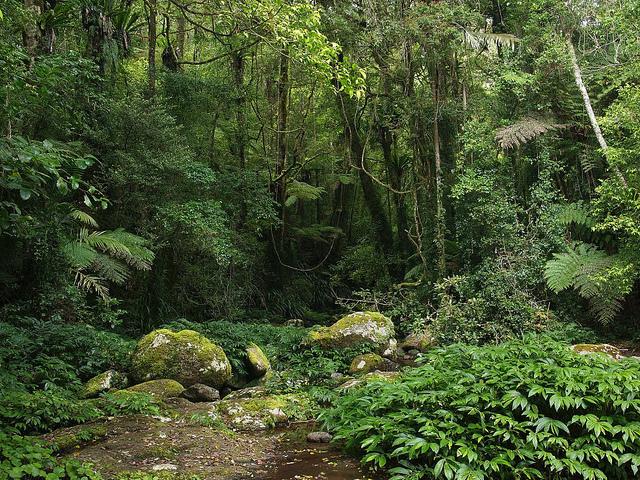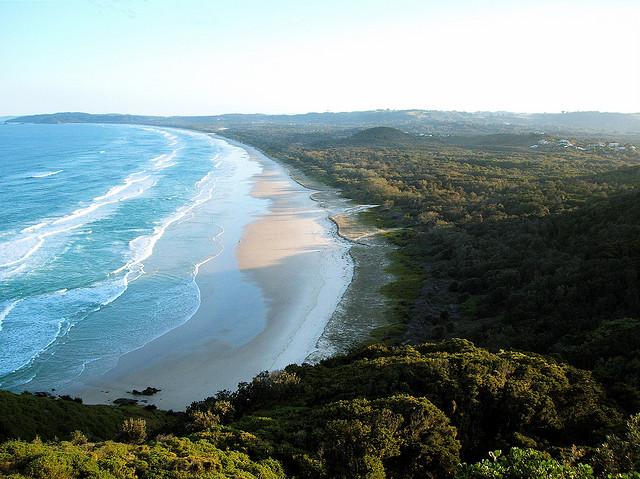What is a Rainforest?
Rainforest is described as tall, hot and dense forest near the equator and is believed to be the oldest living ecosystems on Earth which gets maximum amount of rainfall. As the name implies, rainforests are the forests that get very high amount of rainfall every year, more than the normal annual rainfall of 1750–2000 mm (68-78 inches). Most of the rainforests in this world are located around the middle of earth near the equator like South and Central America, Africa, Asia and Australia.
Rainforests cover about 6% of the total surface of the Earth and are home to more than half of the species of plants and animals of the world. At least two-thirds of the total plant species grows in the rainforests. The hot and humid climate of rainforest is very supportive to the growth of plants and animals. It is believed that there will be many millions of species of plants, insects and micro-organisms thriving in rainforest which have not been discovered still.

Importance of Rainforests
The main benefit of rainforests is that they supply much of the earth’s oxygen. They absorb carbon dioxide produced by man made activities and produce oxygen on which all humans and animals survive. They also contain millions of species of exotic plants and animals. Rainforest supplies many things essential for the survival of human and other living beings. Importance of rainforests can be derived from the items that they supply. Some of these are listed below:
- Natural medicines
- Oxygen production
- Sugar
- Spices such as coconut, vanilla, turmeric, ginger etc.
- Rubber
- Bamboo
- Pineapples
- Chocolates that come from cocoa which grow on trees in rainforests
Apart from this, they also:
- Stabilize world’s climate.
- Are an interesting place to visit.
- Maintain water cycle.
- Provide home to tribal people.
- House more than 1/2 of the world’s plant and animal species.
- Protect environment against soil erosion, floods and droughts.
A rainforest needs a adequate amount of rainfall and sunlight to grow tall and large. Areas near equator doesn’t have any seasons because neither it tilt towards or away from the sun. It remains warm (16 degrees Celsius) and receives more than 1000 centimeters of rainfall throughout the year. They cover only about 6% of the earth’s surface and more than 30 million species of plants and animals live in tropical rainforests. Many exotic species of plants and animals grow in rainforest.
Layers of a Rainforest
A rainforest is divided into following four layers. Each layer has characteristic flora and fauna adapted for life in the particular surroundings.
- Emergent layer consists of tallest trees, standing as high as 200 feet above the floor of the forest. Most of these trees are hardwood evergreens with broad-leaves. Sunlight is also abundant in this region. Eagles, bats, monkey and butterflies are main animals found here.
- Canopy layer forms the primary layer of the forest. The trees have smooth, oval leaves that form a dense maze, covering the other two layers as a wide roof. Food is abundant in this layer. Therefore lots of animals live here such as snakes, toucans and tree frogs.
- Understory layer consists of shorter plants which seldom grow to a length of 12 feet. Very little sunshine reaches this area therefore plants grow larger leaves to get sufficient sunlight. Insects are found in large concentration along with other animals like jaguars, red-eyed tree frogs and leopards.
- Forest Floor is a very dark portion of rainforest with almost no plants. Because no sunlight reaches this layer, plants decay very fast. Only giant anteaters are found in this region.
Types of Rainforests
Tropical rainforests are warm and wet, characterized by mean monthly temperatures of more than 180C (64OF) around the year and average annual rainfall of about 400 inches. These are located in the monsoon trough, between the Tropic of Cancer and Tropic of Capricorn. They have thousands of broad-based leaves aged between 50-100 years old. Diverse variety of plants and animals occupy tropical plants. Decomposition occurs at a very fast rate in tropical rainforests. These are also known as ‘Earth’s lungs’ because they contribute oxygen to the atmosphere. Most of the world’s tropical rainforests are present in – Southeast Asia, Sri Lanka, sub-Saharan Africa, South America, Central America and Pacific Islands.

Temperate rainforests are cool and wet, characterized by mean annual rainfall of 50-140 inches and average daily mean temperature of around 50-80 degrees. These are located in the temperate regions. They have evergreen trees aged between 500-1000 years old. The temperate rainforests possess seasonal climate, hence less diversity of flora and fauna. Trees generally have needle-like leaves. In temperate rainforest, decomposition occurs at comparatively slow rate. Temperate rainforest are commonly found in North America, East Asia, Europe, South America, Australia and New Zealand.
Montane forests are also known as cloud forests, located on mountains and containing shorter trees such as oaks, pines and rhododendrons.
Lowland rainforests possess consistent weather throughout the year with same rainfall and humidity every day. It has tall trees with great diversity of plants and animals.
Flooded rainforests are the ones that flood for short or long periods of time due to heavy rains. ‘Varzea’ refers to these forests that flood for short period of time with water levels as much as 10 meters while ‘Igapo’ means forests that flood for long period of time, up to 11 months, with water levels as much as 12 meters. Trees and fish adapt to survive in this environment – trees form strange shapes and freshwater fish enter into these flooded forests.
Mangrove forests are found on river banks and coasts. These consist of wetland plants which filter the water that flows through them. These trees reach a height of 24 meters and possess stilt-like roots to prevent decomposition in water. They can survive in salty environment with periods of drought in the dry season.
References:
http://www.zoomschool.com/subjects/rainforest/

